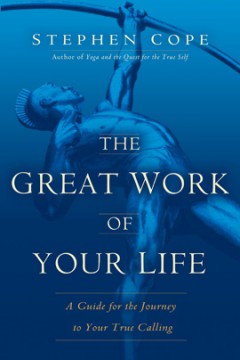
“You cannot steer your dharma with the vehicle of self-will—the will of the small “s” self.” – Stephen Cope, The Great Work of Your Life: A Guide for the Journey to Your True Calling
Do not read The Great Work of Your Life by Stephen Cope, if you are not prepared to re-examine your life. I reviewed this book in the LifeForce Yoga Research and Reviews newsletter in 2012, but as I look back on books that have influenced me this past year, I can sense important ways that Cope’s book is still changing me. So I’m writing about it again. If, like me, you never want to stop growing, if you want your actions to be aligned with your most authentic expression of self, if you are fascinated by the elements that create a meaningful life of service and love in the world—and how they manifest in extraordinary lives like Beethoven, Harriet Tubman and Gandhi and ordinary lives like yours and mine, then this is a book you must read. Savor it, discuss it, read it out loud and let it be the basis for your next study group.
Author, psychotherapist and yogi Stephen Cope is the director of the Institute for Extraordinary Living at Kripalu Center and he brings the light of one of India’s most sacred texts to the seeker’s central question of living a purposeful life. This deep inquiry is rooted in the Bhagavad Gita, but you need not have an interest in yoga to explore with him questions of meaning and purpose central to your own life. Don’t be fooled into thinking this is just a young person’s book—perfect for the college graduate trying to find his way in the world or the young mother contemplating whether to stay home with her adored newborn or return to the work she loves and for which she has prepared herself. It is a young person’s book. But it’s also a mid-career person’s book. It’s also a book that gives meaning to changing careers, to retirement, to accepting health challenges, to aging and to death.
How does Cope address so many of our deepest concerns? He does this through the lives examined in the twelve chapters, each of which could be its own book. Cope is so honest about his own fears that, as readers, we cannot run from ours.
We meet characters paralyzed by doubt, caught between two conflicting choices, just as Arjuna was in the great battle that is the catalyst for the dialogue with his charioteer Lord Krishna in the Bhagavad Gita. We meet characters who feel their dharma has been “used up.” What happens when we’ve been living our passion for decades, and it has begun to grow stale? Other characters are living lives tangential to their dharma without going full out. The stories of how ordinary people have tackled such dilemmas may push us into taking the action to reinvent ourselves.
The writing is clear, sharp, passionate, and contagious. How can you not explore your choices, past and future, along with Cope as he illuminates the lives of John Keats, “whose life was a bonfire of desire for dharma,” or Marion Woodman, who is “living with death as a daily ally,” or Cope himself, who asks himself if his “concern for living fully…is driven precisely by this. By death”?
Before reading the Great Work of Your Life, I often asked of myself and my students: How can I strip away what is no longer serving? I meant serving me, serving you. Now I am asking myself: How can I strip away what is no longer serving the world?
I’ll end this review with a quote from the epilogue of the book. “Dharma saves us not by ending but rather redeeming our suffering. … It enables us to bear our suffering. And, most important, it enables our suffering to bear fruit for the world.”
Available for purchase on Amazon.
So many of us have grown our hearts bigger through our suffering and have found ways to serve from that place of compassion. If you are a yoga or health professional, you may find a new ways to serve others as a LifeForce Yoga Practitioner, empowering your clients to manage their moods. Click here to learn more about the LifeForce Yoga Practitioner Training.
